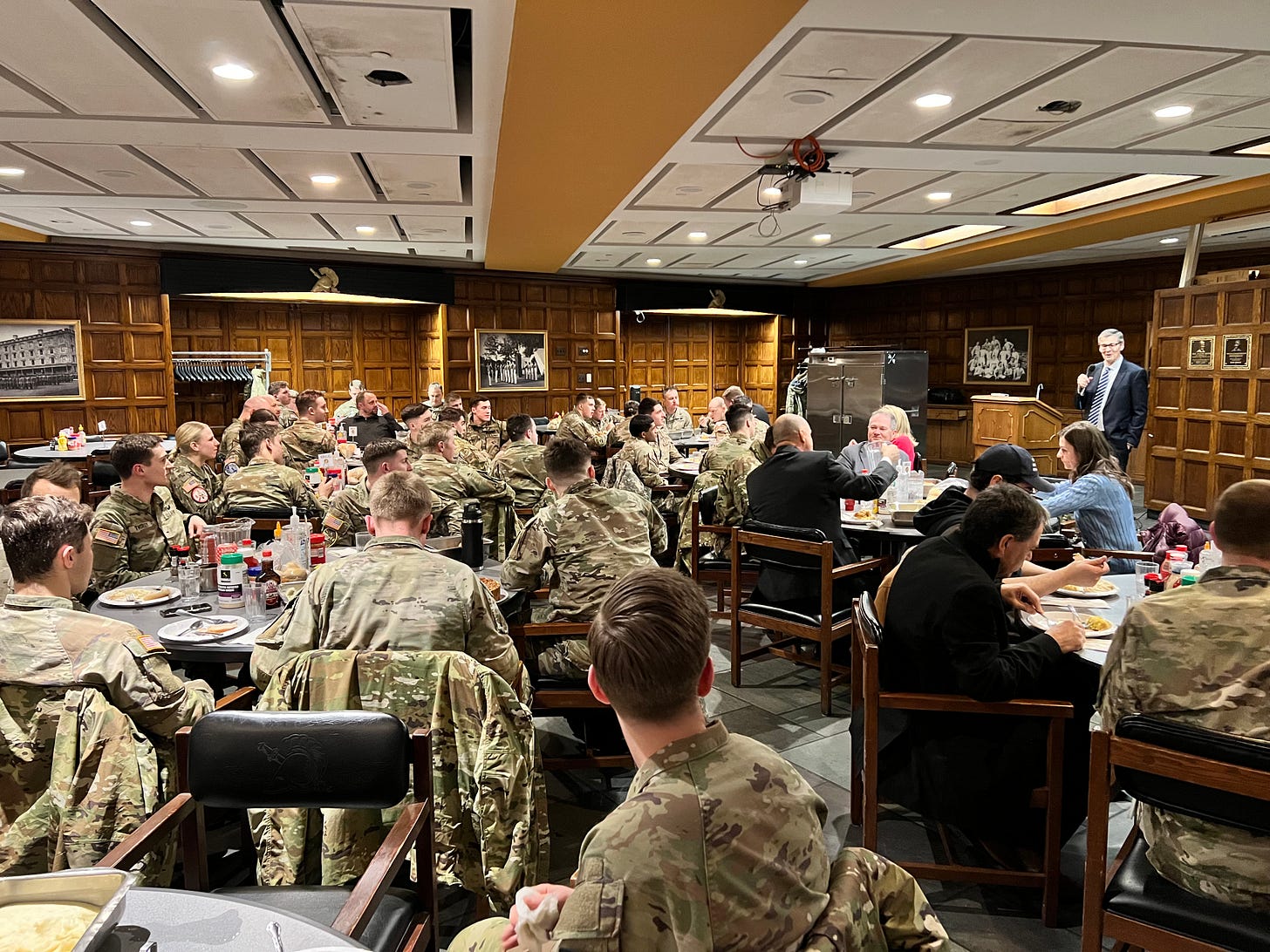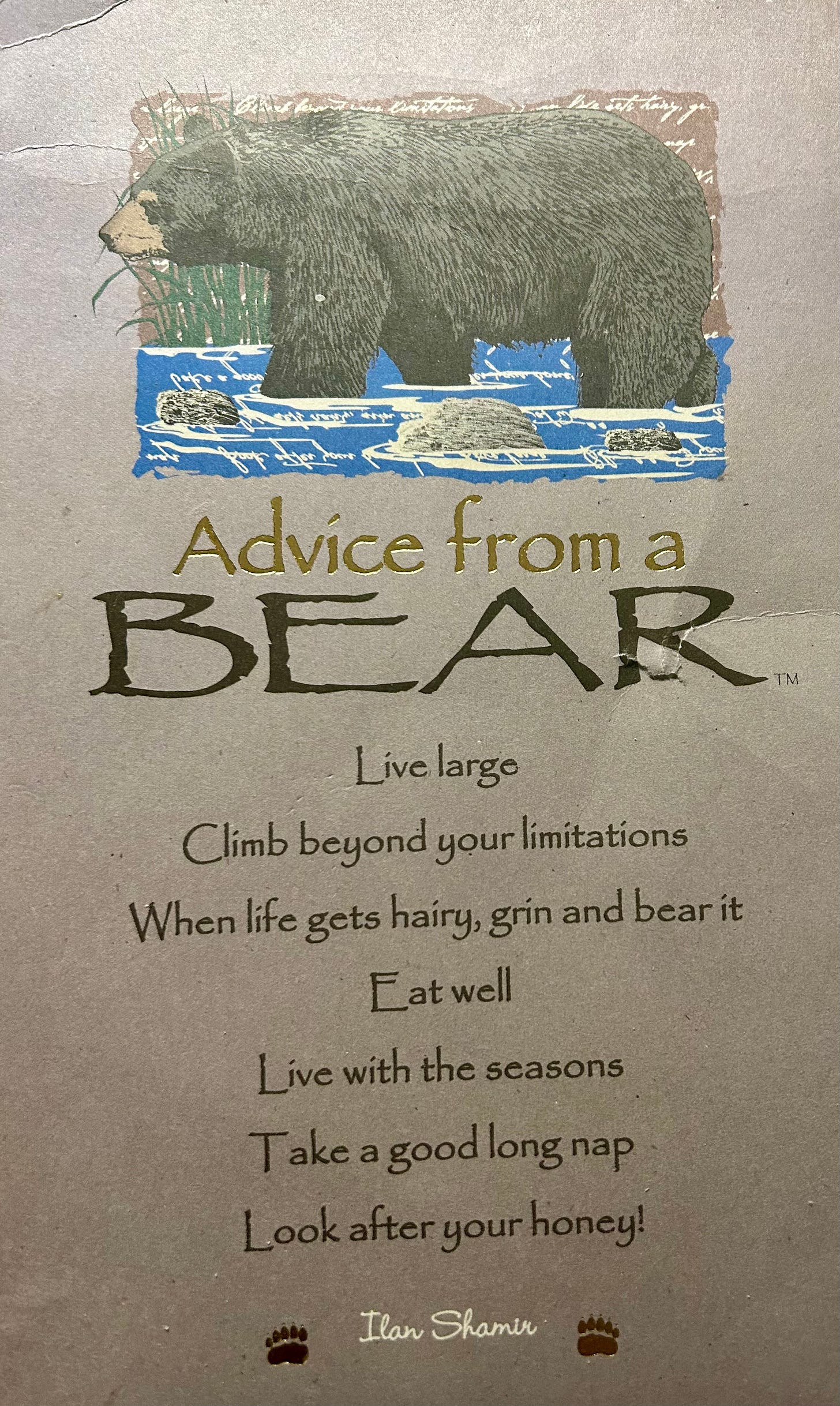Be a Warrior - Act Like a Buffalo!
Warriors Are People of Tremendous Character while Buffalo Attack Life’s Storms
Mis compañeros, amigos, y familiares,
Buenos días. It is time for some early morning reading, reflecting, and writing.
What’s on my mind this morning:
An amazing friend in our greatest time of need and his wife visited this week and inspired me and others towards greater things - thank you Steve and Kalleen Lund!
It is Super Bowl Sunday - who are you rooting for? My son now lives in Eagles Country - Fly Eagles Fly! I also met Andy Reid several years ago and was really impressed - Go Chiefs!
We had a couple of winter storms in the area this week - I have been thinking about the storms of our lives and do we run from them or attack them?
I have also been thinking about warriors - I dont think we get the definition right as true warriors are not just fighters, but people of tremendous character focused on selflessly putting the needs of others ahead of their own in all areas of life
It is February in the northeastern United States - so it can be a little stormy (not Stormi our dog, but in this case stormy like its really cold, snows, and the wind blows from Canada down the Hudson Valley cutting right through you to the bone).
I took this picture of the First Division Barracks at West Point Thursday morning. My Cadet self from many years ago thought something along the lines of ‘this is what hell looks like when it freezes over’
The First Division Barracks - home of the Simon Center for the Professional Military Ethic at West Point, NY:
BLUF: How do you react to life’s storms? Buffalo turn into the storm to confront or attack the challenge. Beyond that, what is your definition of a Warrior? I embrace the Native American definition of someone who cares deeply for others and is willing to selflessly sacrifice for the members of the tribe.
When I say I live within 50 miles or so of New York City, most folks think of a suburban neighborhood, but the truth is the area is better described as the Hudson Highlands - a somewhat mountainous area along the Hudson River. The road between West Point and my home in New Windsor, NY is a winding highway over a terrain feature named Storm King Mountain.
This week I got to drive over Storm King Mountain twice during a snow storm - first Thursday morning and then again last night. I admit I didn’t take a picture of the trip (I was trying to stay focused on driving) but it reminded me of a lesson about buffalo.
“Cows run away from the storm while the buffalo charges toward it — and gets through it quicker. Whenever I’m confronted with a tough challenge, I do not prolong the torment, I become the buffalo.” - Wilma Mankiller, First woman Principal Chief of the Cherokee Nation.
Several years ago the family visited Yellowstone and we encountered a herd of buffalo. They were impressive, powerful animals of tremendous size.
When a snowstorm is coming, buffalo instinctively turn directly into the storm. They face it head on instead of trying to run away or hide.
Walking into the storm means the storm passes by more quickly. The buffalo understand that charging through the storm minimizes the amount of time they spend exposed to the harsh weather conditions. There is discomfort, but the discomfort doesn't last as long.
How do you react when the storms of life come?
We often discuss the fight (face it head-on) or flight (avoid it) response. If you think your tendency is to look away and avoid the pain, you wouldn't be alone.
We may not always control what happens to us, but we always have control of OUR RESPONSE TO WHAT HAPPENS TO US. We have to train ourselves to choose to be more like a buffalo and face the storm head on.
If we do this over and over it can become our default response, but it takes work and repetition to gain control of our emotions and create the attitude that we will attack life’s challenges instead of looking for ways to avoid them.
What happens when we choose to react like the buffalo?
Resilience. Often the problem or situation we've been avoiding isn't as bad as we thought it would be.
Accelerates Growth. Facing the storm in a deliberate way gives us a posture for learning and growing. People want to see this in their leaders. It inspires courage in the team and courage is contagious.
Less Discomfort. Like the bison, the storm often passes by more quickly when we face it head on. I won’t pretend like it is fun, but it doesn't last as long.
Self-Mastery. Each time we successfully navigate a tough situation, we prove to ourselves we're capable of handling it. This builds confidence and reduces fear when we face the next storm.
Creativity. Difficult situations often require creative solutions. Facing problems directly helps us innovate and see opportunities we would otherwise miss.
I challenge you to act more like a buffalo to attack life’s storms providing greater growth!
Beyond being like a buffalo - lets wrestle with what it means to be a WARRIOR
“Nobody is born a warrior, in exactly the same way that nobody is born an average man. We make ourselves into one or the other.” - Carlos Castandeda
Similarly to learning to become like a buffalo (I told you to be a bear a few weeks ago) you can deliberately build the capability to become a warrior. But you have to understand that being a warrior may not be what you think it is.
As the Old French guerre meant "war," it led to the word guerreor for someone who wages war. This eventually morphed into the definition we tend to visualize as warrior.
The Army uses what we call the Warrior Ethos:
I will always place the mission first,
I will never accept defeat,
I will never quit,
I will never leave a fallen comrade
The Warrior Ethos is a set of principles by which every Soldier lives. In a broader sense, the Warrior Ethos is a way of life that applies to our personal and professional lives as well. It defines who we are and who we aspire to become.
If you think deeply about this definition - it isn’t the fighter definition that often comes to mind. The warrior tradition isn’t always about combat. It’s about keeping the peace and making sure traditions and cultures stay aligned with values.
For thousands of years, American Indians have protected their communities. A warrior’s customary role, however, involved more than just fighting. Warriors cared for families in need and helped during difficult times. They did anything to ensure their people’s survival, including laying down their lives.
Today, many American Indians view service in the U.S. Armed Forces as a continuation of the customary role - an extension of the warrior culture. It’s part of an ancient tradition and for some Native American tribes, a vital expression of their spirit.
As a result, Native Americans have served in the Armed Forces at a higher rate per capita than any other group. This tradition of service continued for many generations in the Native American population because the warrior path was a significant way of life.
“Native men and women fill that role through military service, through protecting the language, guarding the culture, providing food, shelter, education, and medical assistance to other community members. So for me, the warrior tradition is defined more broadly than just combat." - Patty Loew, Bad River Band of Lake Superior Ojibwe
That is the key - a warrior’s character, who they are authentically and holistically as seen through their actions - doing the right thing, for the right reason, with the right emotion, and the right attitude, is demonstrated consistently. They live what the tribe values very day!
Sitting Bull provides an excellent definition of a warrior:
“Warriors are not what you think of as warriors. The warrior is not someone who fights, because no one has the right to take another life. The warrior, for us, is one who sacrifices himself for the good of others. His task is to take care of the elderly, the defenseless, those who cannot provide for themselves, and above all, the children, the future of humanity.” - Sitting Bull (c. 1831 - 1890), Hunkpapa Sioux.
If you want to learn more, I encourage you to watch The Warrior Tradition on PBS :
This week I will:
Be a Buffalo - attacking life’s storms
Be a Warrior - live a life of honor caring selflessly for others and consistently living my values demonstrating virtues in action!
Still gotta be a Bear!
Keep the oaths, covenants, and commitments I have made with all my heart, mind, soul, and body
Make each day my masterpiece but seeking to improve daily - comparing myself to me, yesterday!
Fight for the right things - Fight Hard - Fight on to Victory!
Dewey
I reflect each week on what I have been learning - I encourage you to reflect daily or weekly as well. I share these notes just to get you thinking about topics related to leadership and character - Do great things!
My friend and mentor Elder Steven J. Lund at West Point this week:
Be a Bear (and a Buffalo, and a Warrior)







Well, my brother, I’m from Buffalo… how can I disagree! Thank you for sharing your motivation. We must take on hard things and seek victory. We must also acknowledge that the effort may not be without loss of some sort. Nonetheless, the effort must be made for the good of the tribe, for the tribe is more important than the one.